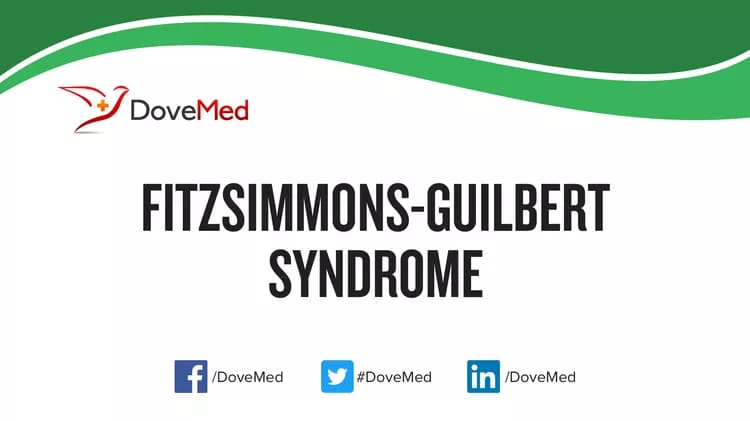What are the other Names for this Condition? (Also known as/Synonyms)
- Fitzsimmons Syndrome
- Spastic Paraplegia Associated with Brachydactyly Type E
What is Fitzsimmons-Guilbert Syndrome? (Definition/Background Information)
- Fitzsimmons-Guilbert Syndrome is characterized by slowly progressive spastic paraplegia, skeletal anomalies of the hands and feet with brachydactyly type E, cone-shaped epiphyses, abnormal metaphyseal phalangeal pattern profile, sternal anomaly (pectus carinatum or excavatum), dysarthria, and mild intellectual deficit
- It has been reported in five patients, among which there were two sets of identical twins. The significance of the relationship between the twinning process and the condition is not clear. The mode of inheritance is unknown but single-gene transmission seems likely
(Source: Fitzsimmons-Guilbert Syndrome; Genetic and Rare Diseases Information Center (GARD) of National Center for Advancing Translational Sciences (NCATS), USA.)
Who gets Fitzsimmons-Guilbert Syndrome? (Age and Sex Distribution)
- Fitzsimmons-Guilbert Syndrome is an extremely rare congenital disorder. It has been only described in 5 individuals so far, including 2 sets of identical twins
- Both males and females may be affected
- Worldwide, individuals of all racial and ethnic groups may be affected
What are the Risk Factors for Fitzsimmons-Guilbert Syndrome? (Predisposing Factors)
- A positive family history may be an important risk factor, since Fitzsimmons-Guilbert Syndrome can be reportedly inherited
It is important to note that having a risk factor does not mean that one will get the condition. A risk factor increases one’s chances of getting a condition compared to an individual without the risk factors. Some risk factors are more important than others.
Also, not having a risk factor does not mean that an individual will not get the condition. It is always important to discuss the effect of risk factors with your healthcare provider.
What are the Causes of Fitzsimmons-Guilbert Syndrome? (Etiology)
The genetic cause and mode of inheritance of Fitzsimmons-Guilbert Syndrome is not known at the present time.
What are the Signs and Symptoms of Fitzsimmons-Guilbert Syndrome?
The signs and symptoms of Fitzsimmons-Guilbert Syndrome may include:
- Babinski sign
- Brachydactyly
- Broad hallux
- Broad thumb
- Cognitive impairment
- Cone-shaped epiphyses of the phalanges of the hand
- Decreased body weight
- Enuresis nocturna
- Feeding difficulties in infancy
- Global developmental delay
- High palate
- Hyperreflexia
- Malar flattening
- Narrow face
- Nasal speech
- Pectus carinatum
- Pectus excavatum
- Pes planus
- Progressive spastic paraplegia
- Scissor gait
- Short finger
- Short metacarpal
- Short metatarsal
- Short phalanx of finger
- Short stature
- Short toe
(Source: Fitzsimmons-Guilbert Syndrome; Genetic and Rare Diseases Information Center (GARD) of National Center for Advancing Translational Sciences (NCATS), USA.)
How is Fitzsimmons-Guilbert Syndrome Diagnosed?
Fitzsimmons-Guilbert Syndrome is diagnosed on the basis of the following information:
- Complete physical examination
- Thorough personal and family medical history evaluation
- Assessment of signs and symptoms
- Laboratory tests
- Imaging studies
- Biopsy studies, if necessary
Many clinical conditions may have similar signs and symptoms. Your healthcare provider may perform additional tests to rule out other clinical conditions to arrive at a definitive diagnosis.
What are the possible Complications of Fitzsimmons-Guilbert Syndrome?
The complications of Fitzsimmons-Guilbert Syndrome may include:
- Unclear speech (dysarthria)
- Severe intellectual deficiency
Complications may occur with or without treatment, and in some cases, due to treatment also.
How is Fitzsimmons-Guilbert Syndrome Treated?
There is no cure for Fitzsimmons-Guilbert Syndrome, since it is a genetic condition. The treatment is usually given to manage the signs and symptoms and any complication that develops.
How can Fitzsimmons-Guilbert Syndrome be Prevented?
Currently, Fitzsimmons-Guilbert Syndrome may not be preventable, since it is a genetic disorder.
- If there is a family history of the condition, then genetic counseling will help assess risks, before planning for a child
- Active research is currently being performed to explore the possibilities for treatment and prevention of inherited and acquired genetic disorders
Regular medical screening at periodic intervals with tests and physical examinations are recommended.
What is the Prognosis of Fitzsimmons-Guilbert Syndrome? (Outcomes/Resolutions)
- The prognosis of Fitzsimmons-Guilbert Syndrome is dependent upon the severity of the signs and symptoms and associated complications, if any
- Individuals with mild conditions have better prognosis than those with severe symptoms and complications
- Typically, the prognosis may be assessed on a case-by-case basis
Additional and Relevant Useful Information for Fitzsimmons-Guilbert Syndrome:
The following DoveMed website link is a useful resource for additional information:
Related Articles
Test Your Knowledge
Asked by users
Related Centers
Related Specialties
Related Physicians
Related Procedures
Related Resources
Join DoveHubs
and connect with fellow professionals


0 Comments
Please log in to post a comment.